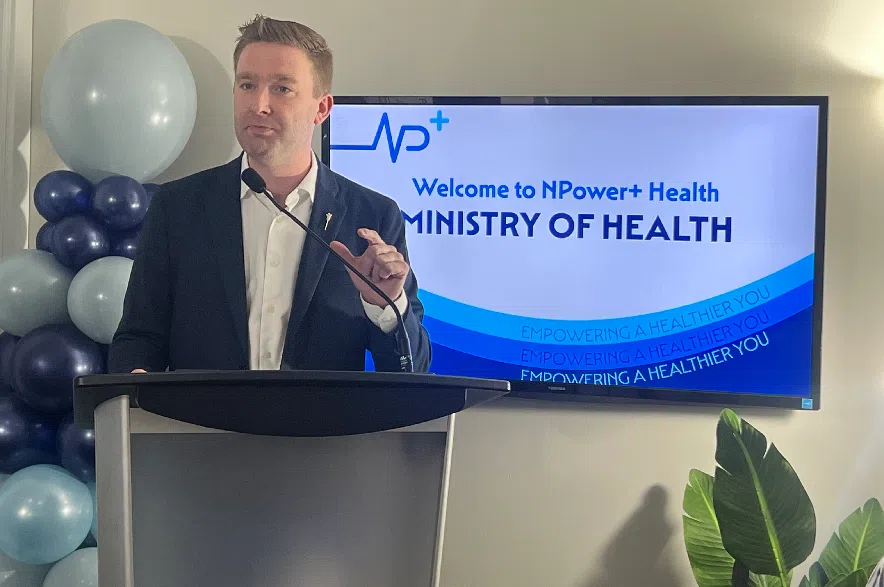The Government of Saskatchewan has signed contracts with 19 more nurse practitioners as it works to expand access to primary health-care services in the province.
The provincial government said that number is expected to rise further over the months ahead, “with up to 30 contracts available.”
Read more:
- Saskatchewan to expand role of nurse practitioners with new health clinics
- Provincial health plans to cover primary care by nurse practitioners: Health Min.
- Health-care officials disappointed with measles re-emergence in Canada
Nurse practitioners work as primary care providers, filling the role that would otherwise be held by a family doctor. The provincial government said nurse practitioners can provide assessments, diagnose and treat both acute and chronic conditions, order tests, prescribe medications, perform medical procedures and refer patients to specialists.
The Government of Saskatchewan has expanded the roles of nurse practitioners in recent years in response to a shortage of family doctors that has been ongoing since the COVID-19 pandemic.
“These new Nurse Practitioner contracts put patients first by expanding access to publicly funded primary care services, helping more Saskatchewan families to get the care they need sooner and closer to home,” Jeremy Cockrill, Saskatchewan’s health minister, said in a statement.

Health Minister Jeremy Cockrill said under the contracts each nurse practitioner will take on at least 800 patients. Each contract costs the province $233,000. (Abby Zieverink/980 CJME)
“Our government is committed to improving access to quality care for every patient, no matter where they live.”
Cockrill said the new nurses will also help take pressure off of emergency departments at hospitals around the province.
“The more that we can strengthen the primary care options available to patients around the province, that’s what’s going to lessen the load on the acute care settings, the emergency rooms,” the health minister said.
He said he expects the ministry will sign around 25 more contracts in the coming months, with nurse practitioners set to work in Regina, Saskatoon, Moose Jaw, Wilkie, Carnduff and Emerald Park.
“There is a good sampling of both urban and rural communities,” Cockrill said.
“Let me take Wilkie, for example. That’s a community close to my hometown. Willkie has struggled with primary-care access for patients over the last number of years, and so the ability for a local gal to get a contract in that community, that’s a game changer for primary care for Willkie residents.”
Cockrill said each contract costs the province $233,000, with each nurse practitioner taking on at least 800 patients under the contract. However, he added, there are further incentives in the contract laid out if they take on more patients, as well as if they offer services in the evenings and on weekends.
He said the goal is to make sure everyone in Saskatchewan has access to a primary care provider by 2028.
The Saskatchewan Ministry of Health said its nurse practitioner contract program – which was first announced in 2024 and followed by an expression of interest in June of this year – was developed “in close partnership” with the Saskatchewan Association of Nurse Practitioners. Michelle O’Keefe, the association’s president, said the program opens up the door for dedicated funding for nurse practitioner services, while also improving health-care access for residents of the province.
“The Saskatchewan Association of Nurse Practitioners is pleased that the initial pilot project has been expanded to offer up to 30 NPs a contract and will continue to work with the Ministry of Health to diversify how funded NP services are delivered within the province,” O’Keefe said in a statement.
O’Keefe said the newly signed contracts will help take pressure off nurse practitioners working in rural communities.
“This allows them the opportunity to build a clinic in their location, where they live, where the farm is, where they’re planning to spend the rest of their lives, and that offers a continuity to the rural residents in that area,” O’Keefe said.
The provincial government said the program “creates more opportunities for Saskatchewan families to access publicly funded primary care,” and noted that it provides an alternative to private nurse practitioner clinics that require patients to pay for services.
“This funding model supports long-term, relationship-based practice and allows me to spend time on thorough assessments and thoughtful follow-up,” said Hanna Latina, a nurse practitioner for Npower+, quoted in a government statement.
“For patients, it means timely access to a dedicated provider with no out-of-pocket cost. All of this leads to better, more holistic health outcomes for patients and stronger communities.”
Toni Tinio is a nurse practitioner at NPower+ Health in Regina, who signed one of the contracts. The practitioner said making services more widely available changes the game.
“We’ve always had that ambivalence, unsure feeling as to whether or not we should keep going for it, because asking for a payment from our patients meant that we are not accessible to everybody,” said Tinio. “Signing a contract means we are able to look after more patients in the community. We’re more accessible and we’re building a healthier Saskatchewan.”
–with files from 980 CJME’s Abby Zieverink











